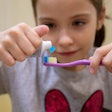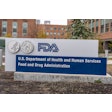Child care center regulations in most states don't support the health standards set by the American Academy of Pediatrics (AAP), missing opportunities to prevent dental caries and obesity among millions of young children, according to a study in Pediatric Dentistry (July/August 2012, Vol. 34:4, pp. 317-324).
On average, state child care regulations cover only a third of the oral health standards and half of the nutrition standards for early care and education programs developed by the AAP in collaboration with the American Public Health Association and the National Resource Center for Health and Safety in Child Care and Early Education.
"Considering the rising rates of both obesity and dental caries among preschool children, child care can be an important point of intervention in today's society," said lead study author Juhee Kim, who was a professor of family studies at the University of Illinois at the time of the study and is now on the faculty of East Carolina University. "We hope that the findings will prompt child care providers to develop and implement comprehensive feeding and oral healthcare policies."
With nearly 75% of U.S. children experiencing regular nonparental day care, federal and state officials have significant opportunities to help safeguard children's health through program regulations and policy, the researchers noted in a press release.
The standards used for the study were outlined in the 2002 edition of the report "Caring for Our Children: National Health and Safety Performance Standards; Guidelines for Early Care and Education Programs." Kim's research team compared the standards against regulations for the 50 states and the District of Columbia that were in force from February to April 2010, according to a database maintained by the National Resource Center.
Of the eight national standards set for children's oral health, the mean number covered by state regulations was 2.6, the researchers found. Seven states -- Arkansas, Hawaii, Idaho, Maryland, Michigan, Montana, and Rhode Island -- included none of the oral health guidelines in their child care regulations. Illinois and West Virginia covered the highest number of oral health standards, with six each.
Children having a toothbrush in child care settings was mentioned in 39 states' regulations, the highest response for any of the oral health topics. However, only 10 states had policies pertaining to the frequency of children's teeth brushing, but eight of them pertained only to children that were in care at night.
Although the national standards recommend that children undergo oral screenings upon entering or at some time during care, only four states -- Massachusetts, Nevada, Pennsylvania, and Virginia -- and Washington, DC, mentioned or implied oral screenings.
Nearly all of the states had regulations that addressed the frequency of children's meals and snacks, which varied from two to four hours, depending upon the number of hours that children were in care. However, eating that frequently without proper oral hygiene contributes to the development of dental caries, the researchers pointed out.
Sugar-sweetened beverages were prohibited by seven states -- Delaware, Georgia, Indiana, Mississippi, New Mexico, North Carolina, and Oregon -- and Georgia, Mississippi, and North Carolina further recommended that nonnutritional drinks be limited to special occasions.
A National Research Foundation grant from the Korean government helped fund the study.



















